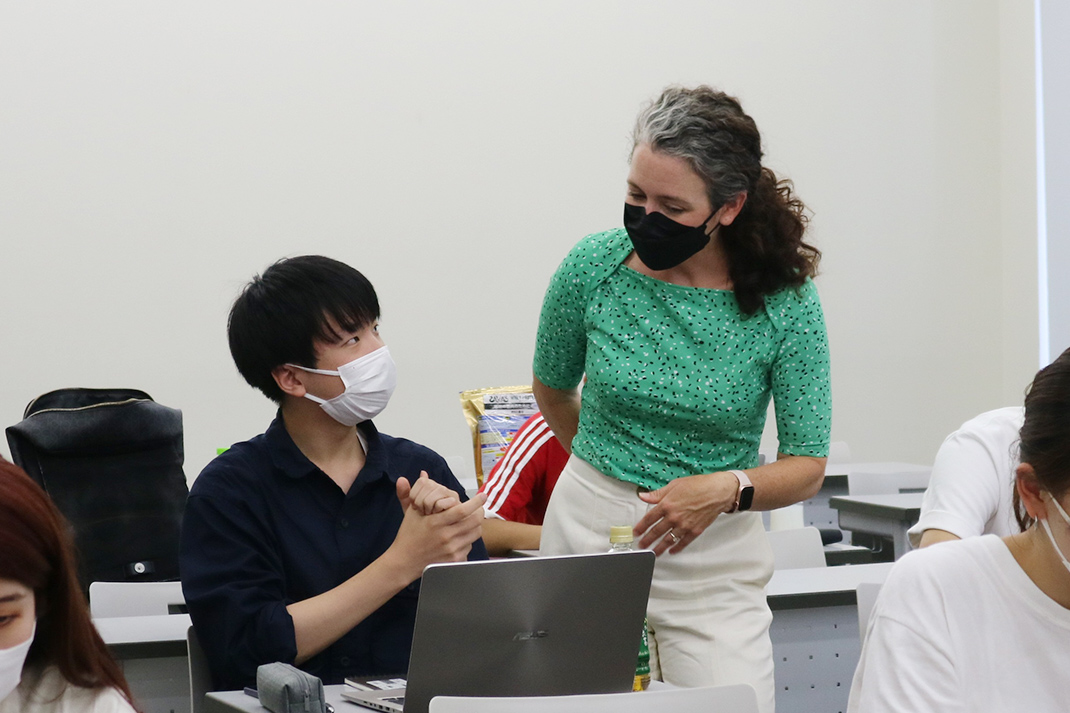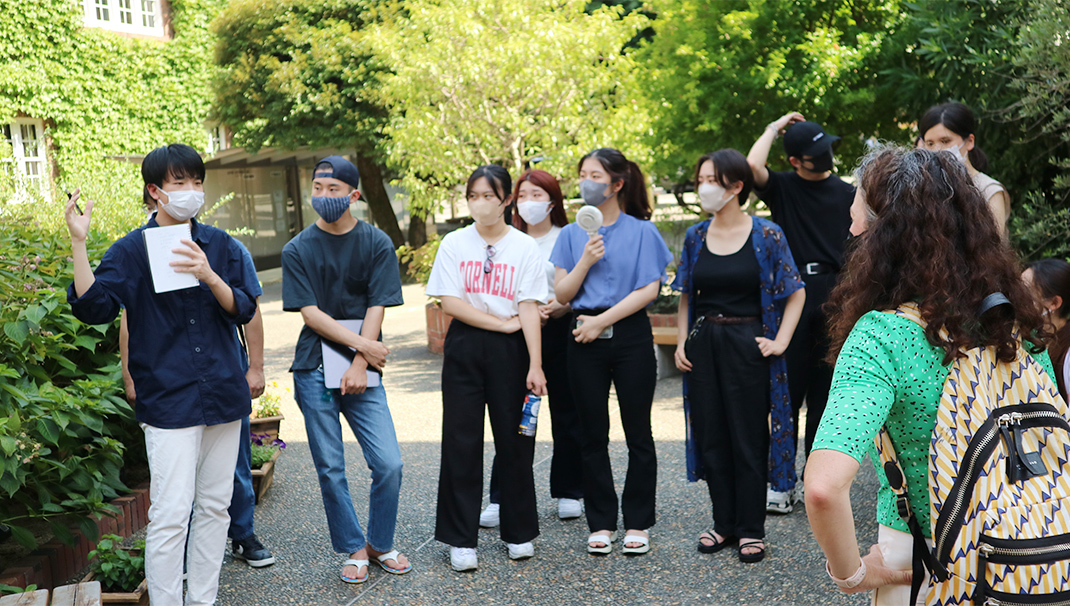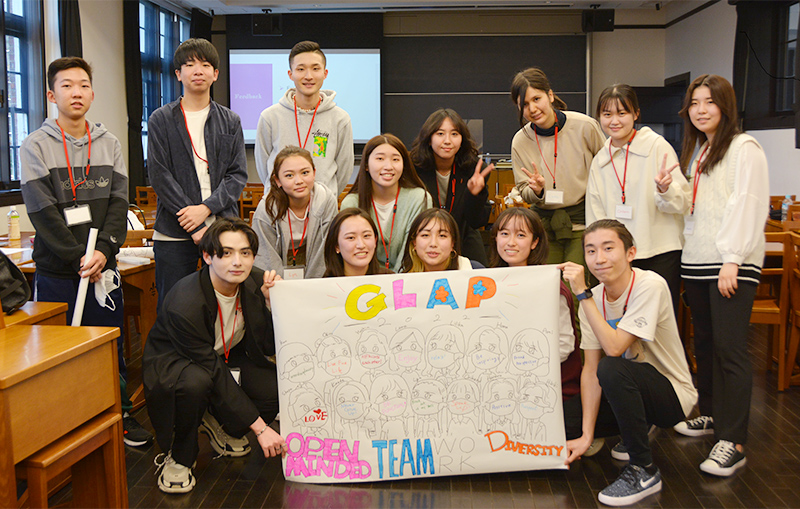Grow with GLAP's interdisciplinary learning!
Tokyo / Junten Senior Highschool Kan Takeuchi
Oct 18, 2022
GLAP Students
Q:Why did you choose to learn in GLAP?
Kan:There are two reasons why I chose GLAP.
The very first reason is that I wanted to learn “Liberal Arts” which is an academic area of study not having a specific limitation on what to learn to acquire comprehensive problem-solving skills. The reason why I found it important to learn the skill roots in a project I ran with my friends when I was in high school. The project aimed to provide educational support for an elementary school in Cambodia, and while doing this project, I realized that even if I could become an expert in a certain field, it does not lead to an inclusive solving of the problem since this problem consists of multiple factors.
The next reason why I chose GLAP is because of its environment; all-English and active learning-based classes with a limited number of students. During my high school life, I sough to learn discussion skills within the international environment.
Kan:I’ve lived in Bangkok, Thailand, and Ulaanbaatar, Mongolia since when I was a child. My stay in Mongolia especially shocked me and motivated myself seeking to be in the field of international cooperation. Although children in the country should spend 8 hours a day at school, just like how it’s done in Japan and other countries, the country took the so-called three-part system. This means that students need to take turns going to school because they lack educational facilities. Being shocked by how different it is compared to my home country, I decided to be in the field of international cooperation in the future. After entering high school, I established a project to provide educational support to a school in Cambodia with my friends and I still keep in touch with those friends.
The very first reason is that I wanted to learn “Liberal Arts” which is an academic area of study not having a specific limitation on what to learn to acquire comprehensive problem-solving skills. The reason why I found it important to learn the skill roots in a project I ran with my friends when I was in high school. The project aimed to provide educational support for an elementary school in Cambodia, and while doing this project, I realized that even if I could become an expert in a certain field, it does not lead to an inclusive solving of the problem since this problem consists of multiple factors.
The next reason why I chose GLAP is because of its environment; all-English and active learning-based classes with a limited number of students. During my high school life, I sough to learn discussion skills within the international environment.
Q:What made you interested in international cooperation?
Kan:I’ve lived in Bangkok, Thailand, and Ulaanbaatar, Mongolia since when I was a child. My stay in Mongolia especially shocked me and motivated myself seeking to be in the field of international cooperation. Although children in the country should spend 8 hours a day at school, just like how it’s done in Japan and other countries, the country took the so-called three-part system. This means that students need to take turns going to school because they lack educational facilities. Being shocked by how different it is compared to my home country, I decided to be in the field of international cooperation in the future. After entering high school, I established a project to provide educational support to a school in Cambodia with my friends and I still keep in touch with those friends.

Actively asking questions to professor
Q:Was the importance of being able to study in a small group a major factor in your choice of school?
Kan:Yes, it was. Since the English classes in my high school were also small classes, I understood the importance of being able to communicate with classmates actively, and it was definitely one of the factors when choosing which university to go to.
Q:What makes small class in GLAP from that of high school’s?
Kan:Discussion in high school was discussion within the framework of a textbook. On the other hand, in GLAP, although there are directions on what we need to discuss, professors put the most emphasis on what students discuss. Since much of the discussion is left to the student's initiative, the degree of freedom of discussion has expanded.
Q:What kind of course is Tutorial?
Kan:I believe this is the most important course in GLAP. This class makes me aware of how to learn not only in Rikkyo as a whole but also in GLAP. In particular, we are required to do a ten to fifteen-minute presentation and discussion based on each chapter that we read weekly. We even make this into an essay each semester. There are only a maximum of five students in each class which allows us to be closer to professors. They not only give us advice on presentations and slides, but they also provide different ways to read and understand chapters. Since I like to do presentations, I am glad to have such an opportunity to grow my ability to express my ideas.
Q:Are there a lot of assignments in each courses?

Sharing ideas in fieldwork
Kan:I feel that there are more assignments that we have to do compared to the other faculties. In most of the classes, we are required to prepare by reading or researching before classes. Moreover, this environment with a small number of students allows professors to pay closer attention to us, which motivates me to learn even harder. Although I find it tough to learn in GLAP, the fact that I am willing to actively learn Liberal Arts makes it very enjoyable to do assignments.
Q:What kinds of backgrounds do students in GLAP have?
Kan:It’s quite diverse; from people who had been to study abroad when they were in high school to those who had lived abroad since they were born. Since this is such a small community, I have a lot of chances to work with not only friends in the same grade but also seniors. We usually spend time in the Global Lounge. Our daily conversation involves both Japanese and English. As I just mentioned, since this is quite a diverse community, we all respect each other’s thoughts and ideas.

With classmates in orientation in April
Q:How do you balance classes and other activities such as circles?
Kan:I am currently a member of ESS Drama, which is a circle to make English plays and I go there five times a week. Since GLAP have more assignments compared to the other programs, I make a point to make reminder so that I don’t forget due dates. I work on my assignments during the weekends too.
Kan:Among numerous fields within international cooperation, I would like to learn the academic field of “Educational Leadership” which researches curriculum development and how to lead teachers. In the example of Cambodia, the problem was that the curriculum was old that it doesn’t fit students’ needs and situations. I want to learn in order to find a solution to this kind of problem.
Kan:Through the Liberal Arts education in GLAP, I would like to acquire broad knowledge and specialize in graduate school. After that, I’m planning to work in the field of international cooperation, especially in projects related to educational support.
*as of the time of this interview
Q:What do you want to learn in Study Abroad?
Kan:Among numerous fields within international cooperation, I would like to learn the academic field of “Educational Leadership” which researches curriculum development and how to lead teachers. In the example of Cambodia, the problem was that the curriculum was old that it doesn’t fit students’ needs and situations. I want to learn in order to find a solution to this kind of problem.
Q:How are you thinking of your carrier after graduation?
Kan:Through the Liberal Arts education in GLAP, I would like to acquire broad knowledge and specialize in graduate school. After that, I’m planning to work in the field of international cooperation, especially in projects related to educational support.
*as of the time of this interview
